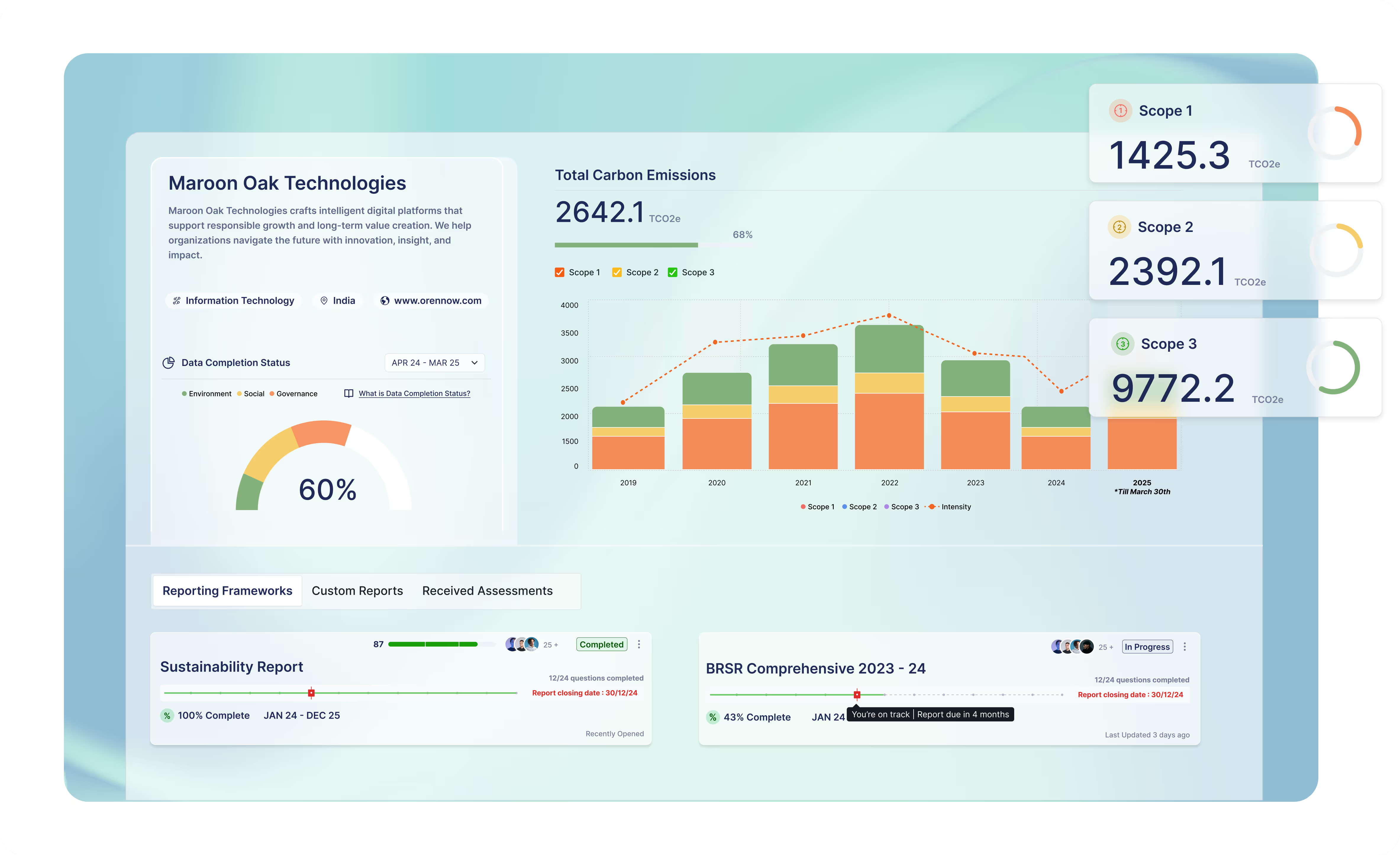Importance Of Supply Chain Sustainability For Your Business

A company’s supply chain is the network of people, processes and organisations involved in producing and delivering goods from raw materials to customers. Supply chain sustainability focuses on minimising environmental impact, promoting ethical practices, and ensuring long-term efficiency of that network. It achieves so by integrating environmental, social and economic considerations throughout the production, manufacturing and distribution process.
Significance
Supply chain sustainability has become crucial today due to the growing interest of customers and investors in responsible business practices. Companies also need to maintain transparency to attract value-driven investors. It ensures compliance with environmental and labour regulations. Moreover, sustainable practices strengthen supply chain resilience, ensuring consistent operations and the well-being and availability of workers. It ultimately supports long-term business stability and reputation.
Transition From Conventional to Sustainable Supply Chains
Traditional supply chains have long prioritised speed, cost, and reliability. However, with the growing emphasis on sustainability, companies are now integrating environmental, social, and governance (ESG) principles into their operations. A sustainable supply chain not only minimises environmental impact but also promotes social responsibility and economic efficiency. Companies that adopt these practices are better positioned to thrive in today’s globalised economy, where stakeholders increasingly demand transparency and ethical behaviour.
Real-World Examples of Sustainable Supply Chains
The practical examples of practising supply chain sustainability are as follows:
- To manufacture clothes by reusing materials such as used garments or recycled plastic bottles and resell them as ‘upcycled’ goods
- Usage of sustainable transportation options to transport raw materials from suppliers to the company’s manufacturing facility and from the facility to the end-customer
- Paying upfront to farmers and ensuring storage risk protection by food companies to reduce financial uncertainty and enhance investment
Ubiquity and Impact of Supply Chains
As David Waters aptly put it, "Supply chain is like nature, it is all around us." Indeed, supply chains are ubiquitous, affecting every industry and region worldwide. Whether it’s a multinational corporation or a small family business, every entity is part of a supply chain. It links production, distribution and consumption. For instance, the journey of a simple can of cold drink involves multiple stages of production, international transportation, and retail before it reaches the consumer.
This intricate network drives economic growth by connecting markets and creating jobs. It also carries significant social and environmental implications. Research indicates that for most industries, approximately 80% of a company's greenhouse gas emissions originate from its supply chain. Furthermore, issues such as wasted resources, pollution, poor working conditions, and even child labour often lurk within these networks.
Why Sustainability Matters in Supply Chains
The importance of supply chain sustainability is due to a variety of reasons:
Consumer Expectations
The growing awareness among consumers and investors has made supply chain sustainability a business necessity. Consumers now demand transparency, ethical sourcing and responsible labour practices. Non-adherence to it can harm brand reputation and reduce investment opportunities.
Investor Expectations
Adding to it, the investors are also interested in brands operating sustainably. Their decisions are influenced by environmental and social risks of the businesses. Companies linked to high emissions, human rights violations, or weak governance practices face exclusion from sustainable investment portfolios.
Environmental Responsibility
Pollution, deforestation, and poor waste management damage ecosystems and displace communities. They generate emissions, harm the planet, reduce raw material availability and long-term production viability. With the major role of businesses in such environmental impact, both consumers and investors are increasingly concerned.
Legal and Regulatory Pressure
Governments worldwide are tightening sustainability requirements focused on labour rights, environmental protection and ethical sourcing. Ignoring these requirements can result in financial penalties, reputational loss, or supply disruptions.
Key Benefits of a Sustainable Supply Chain
Adopting sustainable supply chain practices offers the following benefits to businesses:
1. Cost Efficiency
One of the most compelling reasons to adopt a sustainable supply chain is cost efficiency. By reducing environmental impact, companies can enhance the efficiency of their operations, leading to significant savings.
For example, Walmart's collaboration with its suppliers to reduce greenhouse gas emissions resulted in a combined savings of $12.4 billion in 2016. Similarly, Nike achieved higher margins and reduced material and labour costs by optimising its supply chain.
2. Improves Brand Image
In today’s digital age, where information spreads rapidly, a company’s reputation is closely tied to its supply chain practices. Supply chains that involve unethical labour practices or environmental harm can lead to public backlash, financial losses, and even boycotts. On the other hand, companies that prioritise ESG standards can bolster their reputation and foster consumer trust.
3. Reduces Environmental Impact
Sustainable supply chain reduces environmental footprint through measures like minimising waste, lowering carbon emissions and supporting more efficient resource usage. The practice reduces reliance on fossil fuels by replacing them with energy-efficient technologies and optimising transportation routes. The usage of less material, optimised packaging and resource efficiency also offers financial benefits.
4. Operational Resilience
Sustainable supply chains improve resilience against disruptions, such as natural disasters, market fluctuations or resource scarcity. Ethical working conditions, fair wages, and secure employment improve workforce stability and productivity. The quality labour standards further increase turnover and reduce skill shortages. It decreases vulnerability during disruptions such as pandemics or geopolitical crises. Sustainability, therefore, supports operational continuity and long-term cost efficiency.
Three Levels of Supply Chains and Their Sustainability Impact
There are three levels of supply chains based on the business’s interaction with the suppliers. Here are the insights into the same and their sustainability impact:
Upstream Tier
It includes suppliers and raw material producers. The challenges here involve sustainable resource extraction, excess energy consumption, harmful emissions, identifying potential resource locations, poor labour conditions, and environmental degradation. It can lead to reputational and regulatory issues.
Mapping the supply chain, conducting audits and collaborating with suppliers offer an effective solution.
Midstream Tier
It is an intermediate stage that links raw material extraction (upstream) to end consumers (downstream). It involves transportation, processing and storage and has a direct impact on energy use, waste generation and emissions. The midstream tier also causes social and economic impact, like labour practices, cost savings, market competitiveness and others.
Contribution to sustainability here is possible by adopting technology, collaboration and communication, with the government and business support and improving transparency.
Downstream Tier
The downstream tier includes distribution, retail and end consumers. Sustainability here focuses on packaging, delivery emissions and product lifecycle management. This tier has an impact on social sustainability with working conditions and consumer safety.
The downstream tier can contribute to sustainability through efficient logistics, digitalisation, circular economy principles and data transparency.
Ways to Make Supply Chains Environmentally Sustainable
The supply chains support environmental sustainability in these ways:
Energy Efficiency across Supply Chain
Improving energy use by adopting renewable power sources can help cut emissions and costs for the company’s supply chain partners. These power sources can be incorporated in manufacturing, storage and transportation. Companies can conduct training sessions for their suppliers to educate them on the best practices.
Additionally, the companies can opt for energy efficiency machinery and implement smart energy management systems. Incorporation of these equipment in warehouses, factories and distribution centres will contribute to lower electricity usage and pollution.
Green Logistics
Green logistics emphasises reducing carbon emissions from transportation. It supports the usage of eco-friendly practices such as
- Fuel-efficient electric vehicles so that transportation relies more on alternative fuels
- Delivery route optimisation to reduce the frequency and distance of travel
- Consolidating shipments to fill vehicles more completely and reduce the total number of trips
- Choosing sustainable packaging such as biodegradable, recyclable and reusable packaging materials instead of single-use plastics
- Reducing packaging waste by ensuring ‘right size’ packets as per the size and weight of the content
Circular Economy Practices
The circular economy involves the use of products and materials for as long as possible. The ultimate aim is to eliminate waste. It minimises raw material extraction and extends product life cycles, which makes supply chains more resource efficient.
The approach to follow to implement the circular economy requires:
- Designing products after considering their complete lifecycle to ensure proper disassembly, repair and recycle
- Resource optimisation, such as that waste products are reused for new product manufacturing
- Encouraging consumers to repair rather than buy new products by offering services accordingly
- Shifting to a ‘Product-as-a-service’ model so that companies retain ownership of a product and sell its use. It will support designing for durability and reuse of the products at the end of their use phase.
Waste Reduction
Minimising waste throughout the supply chain reduces environmental impact and resource consumption. Companies can achieve this through efficient production, adopting lean manufacturing, sustainable packaging and proper recycling of materials. Correct segregation, ensuring less landfill waste and a cleaner and more responsible operation also contributes to supply sustainability.
Strategies for Effective Sustainable Supply Chain Management
Sustainable supply chain management can be achieved with a focus on the following strategies:
Supplier Engagement
It fosters collaboration on environmental and social goals and enhances accountability. Through this, companies can co-develop sustainable processes, share best practices and provide training to suppliers. The improved transparency, along with accountability, allows companies to gather accurate data on carbon emissions and other metrics. It supports credible reporting and helps ensure compliance with regulations.
The collaboration allows for better anticipation and mitigation of risks such as supply disruptions and regulatory changes. The opportunity can also be leveraged for optimising transportation routes, shifting to low-emission fuels and participating in carbon offset programs. Engaging suppliers strategically throughout the lifecycle also helps reduce carbon emissions.
Technology Adoption
The incorporation of new technologies into the business offers improved visibility and transparency in the operations. They can remain updated with digital tracking systems like IoT sensors and RFID tags to provide real-time data. Further, the use of Artificial Intelligence (AI) and Machine Learning (ML), using platforms like Oren Sustainability Hub, helps anticipate the demand and risks to enlighten about overproduction and waste.
Advanced analytics obtained through the technology can provide companies with data needed to measure Key Sustainability Indicators (KSIs) alongside traditional performance metrics. Digital integrations allow for more agile and responsive supply chains that can adapt to market shifts and environmental risks.
Monitoring Sustainability KPIs
The sustainability KPIs provide data to identify risks and inefficiencies by offering insights into the least sustainable practices. It also allows for measuring progress toward goals with regular tracking of the metrics. The data can further be used for the recognition of issues and making informed decisions, and continuous improvement.
Certain sustainability KPIs are directly linked to the operational insights and expenditures. The insights into the same contribute to sustainability by allowing resource optimisation and the elimination of wasteful practices.
Best Practices for Sustainable Supply Chains
Adopting the best practices for a sustainable supply chain can help businesses achieve long-term sustainability. Here is how to ensure sustainability in supply chains:
1. Green Procurement
Source materials from environmentally responsible suppliers who follow ethical labour standards. The provider must also prioritise energy efficiency and promote a circular economy. Additionally, ensure selecting sustainable materials.
2. Sustainability Audits
Systematically evaluate suppliers' performance on environmental, social and economic factors. It helps to identify risks and opportunities timely, ensure compliance and alignment and provide a baseline for measuring progress over time.
3. Collaboration with Suppliers
The collaboration helps achieve long-term relationships and build trust through open and honest communication. The ability to hear all the involved parties helps find a middle ground that helps solve the problems. The collaboration also allows for setting clear and common objectives for sustainability.
4. Certifications
The presence of certificates indicates the company’s commitment to responsible and ethical operations. Certifications like ISO 14001 for environmental management, Fair Trade for ethical sourcing and FSC for responsible forestry ensure compliance with global standards. They help verify sustainable sourcing, promote transparency across supply chains and enhance brand credibility.
Oren’s Commitment to Sustainable Supply Chains
At Oren, we are dedicated to helping companies achieve supply chain sustainability through innovative technology solutions. Our platform, Oren Sustainability Hub, provides comprehensive ESG data and advanced analytics to enhance transparency, improve operational efficiency, and support informed decision-making across the supply chain. We focus on reducing carbon footprints, promoting ethical sourcing and enabling circular supply chain practices through digital integration. By partnering with us, companies can ensure their supply chain meets the highest standards of environmental and social responsibility while driving measurable and long-term sustainability outcomes.
Conclusion
Sustainable supply chains represent the future of responsible and resilient business operations. By integrating environmental responsibility, ethical sourcing, and technological innovation, companies can reduce their carbon footprint. They can build and improve efficiency, build stronger stakeholder trusts, and future-proof businesses against global disruptions.
The mindset shift of consumers, regulatory bodies, and investors toward conscious consumption adds to the necessity of implementing sustainability in the supply chain. It can offer a strategic advantage that supports both business growth and the quality of life on the planet.
FAQs
What Defines a Sustainable Supply Chain?
A sustainable supply chain refers to the integration of social, environmental, and financial practices throughout the entire product lifecycle. It ensures ethical labour practices, efficient resource utilisation, and minimal waste generation. By adopting renewable energy, responsible resource management, and practising the circular economy, companies can reduce carbon emissions and conserve natural resources.
What Is Supply Chain Management (SCM)?
Supply Chain Management (SCM) simply refers to the management of the flow of goods and services. It involves coordinating all the activities, including sourcing, production, and procurement, to storage and distribution. The ultimate goal of SCM is to improve efficiency, reduce costs, enhance customer satisfaction, and mitigate risks.
What Does Sustainable Supply Chain Management Mean?
Sustainable supply chain management means applying sustainability principles to every stage of the supply chain. It integrates environmental protection, ethical labour standards, and economic efficiency in sourcing, production, and distribution. Sustainable supply chain management also focuses on waste reduction, using eco-friendly materials in packaging, promoting positive impacts on local communities, and building resilience to disruptions.
Why Is a Sustainable Supply Chain Critical for Businesses Today?
Sustainable supply chains enhance brand reputation, develop resilience, reduce costs, and ensure regulatory compliance among businesses, making it a critical component for organisations. It also mitigates risks such as climate change shocks, worker exploitation, customer attraction, supply chain resilience, and others.
How Can Businesses Reduce the Environmental Impact of Their Supply Chain?
Businesses can reduce the environmental impact of their supply chain by improving energy efficiency in warehouses, ensuring the use of sustainable materials in production, designing products for a circular economy, and optimising logistics to cut transportation emissions.
What Are the Current Trends in Supply Chain Sustainability?
The current trends in supply chain sustainability include increased use of AI and data analytics for efficiency, adoption of circular economy principles, adopting greener logistics and operations, and ensuring greater focus on end-to-end visibility and traceability.
What Does the Future Hold for Sustainable Supply Chains?
The future for sustainable supply chains will witness innovations in improving the product lifecycle, the evolution of technological integration, increasing focus on resilience, agility, and data-driven decision-making.
Latest Blog Posts
Dive into our blog for insights on making your organization more sustainable.
Sustainability Simplified
Wherever you are in your sustainability journey, we help you advance with confidence.
Schedule a Call





